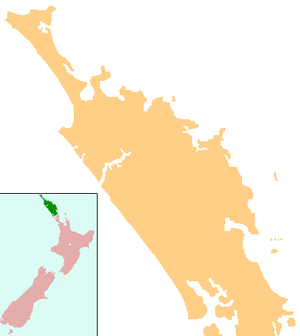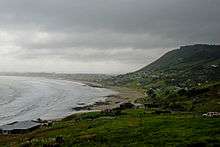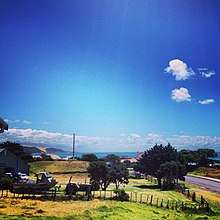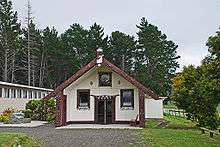Ahipara
Ahipara is a town and locality in Northland, New Zealand at the southern end of Ninety Mile Beach, with the Tauroa Peninsula to the west and Herekino Forest to the east. Ahipara Bay is to the north west. Kaitaia is 14 km to the north east,[1] and Pukepoto is between the two.
Ahipara | |
|---|---|
 Ahipara | |
| Coordinates: 35°10′17″S 173°9′12″E | |
| Country | New Zealand |
| Region | Northland Region |
| District | Far North District |
| Population (2018) | |
| • Total | 1,230 |
| Postcode | 0481 |
Demographics
| Year | Pop. | ±% p.a. |
|---|---|---|
| 2006 | 1,095 | — |
| 2013 | 1,032 | −0.84% |
| 2018 | 1,230 | +3.57% |
| Source: [2] | ||
Ahipara had a population of 1,230 at the 2018 New Zealand census, an increase of 198 people (19.2%) since the 2013 census, and an increase of 135 people (12.3%) since the 2006 census. There were 390 households. There were 597 males and 636 females, giving a sex ratio of 0.94 males per female. Of the total population, 270 people (22.0%) were aged up to 15 years, 204 (16.6%) were 15 to 29, 564 (45.9%) were 30 to 64, and 195 (15.9%) were 65 or older. Figures may not add up to the total due to rounding.
Ethnicities were 60.7% European/Pākehā, 61.2% Māori, 5.9% Pacific peoples, 2.0% Asian, and 2.2% other ethnicities. People may identify with more than one ethnicity.
The percentage of people born overseas was 12.0, compared with 27.1% nationally.
Although some people objected to giving their religion, 40.7% had no religion, 45.9% were Christian, and 8.3% had other religions.
Of those at least 15 years old, 156 (16.2%) people had a bachelor or higher degree, and 180 (18.8%) people had no formal qualifications. The median income was $23,600. The employment status of those at least 15 was that 381 (39.7%) people were employed full-time, 147 (15.3%) were part-time, and 78 (8.1%) were unemployed.[2]
Iwi, Marae & Hapū



Ahipara is located within the rohe (tribal area) of Te Rarawa, and has strong affiliations to the iwi.[3]
Ahipara hosts three marae affiliated with Te Rarawa hapū:[4][5]
- Korou Kore Marae: Affiliated with the hapū Ngāti Moroki. The whare tūpuna is also named Ngāti Moroki.[6]
- Roma Marae: Affiliated with four hapū: Ngāti Pākahi, Ngāti Waiora, Parewhero and Te Patukirikiri. The whare tūpuna is named Te Ōhākī.[7]
- Wainui Marae: Also called Ngāti Moetonga Marae, is affiliated with two hapū: Ngāti Moetonga and Te Rokeka. The whare tūpuna is also named Ngāti Moetonga.[8]
History
Pre-European settlement
The name comes from the Māori language words ahi, meaning fire, and para, a large fern, and can be translated as "a fire at which para was cooked". Prior to the late 18th century, the area was called Wharo, which means "stretched out". That name originated when the chief Tohe ordered a slave to measure the distance the tide had receded, by counting the number of arm-spans from the high water level.[9]
European settlement
The area was popular with kauri gum-diggers during the late 19th and early 20th centuries.[10] The Ahipara Gumfields Historic Reserve is to the south of the town.
Shipwreck Bay (Te Kōhanga in Māori), at the southern point of Ahipara Bay, contains a number of wrecks visible at low tide.[11]
Ahipara Bay was once well known for its toheroa shellfish, but gathering these is restricted due to their near-extinction.[12][13]
Recreation
Ahipara and Shipwreck Bays are popular surfing spots.[14] The area featured in the 1966 surf movie The Endless Summer. Shipwreck Bay has been reported as one of the best left hand surf breaks in the world.[15] See also: Surfing in New Zealand.
Ahipara is on the Te Araroa Trail.
Education
Ahipara School is a coeducational full primary (years 1-8) school with a decile rating of 3 and a roll of 227.[16] It was founded in 1872 as a mission school, and moved to its present site in 1901.[17]
Ahipara Sandhoppers Early Childhood Centre has been operating on the grounds of the Ahipara School for over 20 years.[18] Ahipara Sandhoppers has received recognition for their environmental initiatives.[19]
Environment
Ahipara has a number of coastal care groups, including the Ahipara Komiti Takutaimoana (for present and future sustainable use and protection of the Kaimoana/seafood) and Ahipara Community CoastCare (protection and restoration of the dune environment).[20]
References
- "Northland places". Te Ara: The Encyclopedia of New Zealand.
- "Statistical area 1 dataset for 2018 Census". Statistics New Zealand. March 2020. Ahipara (100600). 2018 Census place summary: Ahipara
- Te Rarawa
- "Te Kāhui Māngai directory". tkm.govt.nz. Te Puni Kōkiri.
- "Māori Maps". maorimaps.com. Te Potiki National Trust.
- Korou Kore Marae: Tūrangawaewae o Ngāti Moroki
- Te Rarawa, Roma Marae
- Te Rarawa Iwi: Wainui Marae
- A W Reed (2002). The Reed Dictionary of New Zealand Place Names. p. 5. ISBN 0-7900-0761-4.
- "The Kauri Gum Industry". ahipara.co.nz. 2004. Archived from the original on 24 July 2011. Retrieved 4 July 2011.
- "Top of the North - Ahipara". Destination Northland. Archived from the original on 2007-10-12. Retrieved 2008-01-12.
- "Aquaculture Bill Submission". Ahipara Online. 11 February 2011. Retrieved 4 July 2011.
- Orange, Claudia (2 March 2009). "Northland places - Aupōuri Peninsula". Te Ara: The Encyclopedia of New Zealand.
- Discover New Zealand - A Wises Guide (9th ed.). Wises Publications. 1994. p. 1.
- "Shipwreck Bay". surfingatlas.com.
- Education Counts: Ahipara school
- "Ahipara Primary School - School Description" (PDF). Archived from the original (pdf) on 2008-10-14. Retrieved 2008-01-12.
- "Ahipara Sandhoppers Early Childhood - ERO Report".
- "Ahipara youngsters lead the way". Predator Free NZ Trust.
- "Coastcare group profiles". Northland Regional Council.
External links
| Wikimedia Commons has media related to Ahipara. |
- Official website
- Ahipara School school website
- Ahipara and Shipwreck Bay
- Ahipara beach at Kaka Street - recreational water quality, Land Air Water Aotearoa
- Ahipara - historic images and articles, National Library of New Zealand
- Natural areas of Ahipara Ecological District Report, New Zealand Department of Conservation